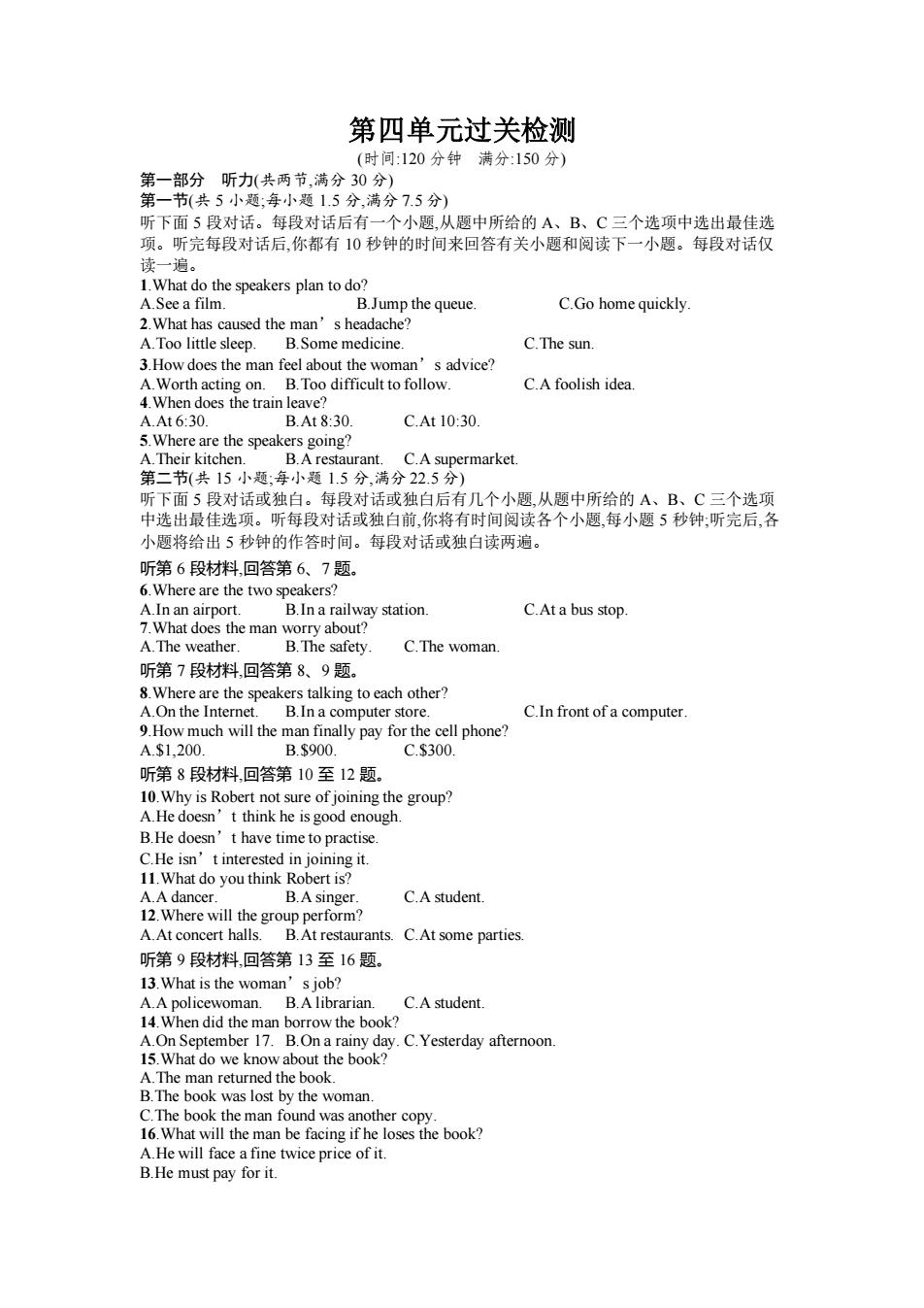
第四单元过关检测 (时间:120分钟满分:150分) 第一部分听力(共两节,满分30分) 第一节(共5小题;每小题1.5分,满分7.5分) 听下面5段对话。每段对话后有一个小题,从题中所给的A、B、C三个选项中选出最佳选 项。听完每段对话后,你都有10秒钟的时间来回答有关小题和阅读下一小题。每段对话仅 读一遍。 1.What do the speakers plan to do? A.See a film. B.Jump the queue. C.Go home quickly. 2.What has caused the man's headache? A.Too little sleep.B.Some medicine. C.The sun. 3.How does the man feel about the woman's advice? A.Worth acting on.B.Too difficult to follow. C.A foolish idea. 4.When does the train leave? A.At6:30. B.At8:30 C.At10:30 5.Where are the speakers going? A.Their kitchen.B.A restaurant.C.A supermarket. 第二节(共15小题;每小题1.5分,满分22.5分) 听下面5段对话或独白。每段对话或独白后有几个小题,从题中所给的A、B、C三个选项 中选出最佳选项。听每段对话或独白前,你将有时间阅读各个小题,每小题5秒钟:听完后,各 小题将给出5秒钟的作答时间。每段对话或独白读两遍。 听第6段材料,回答第6、7题。 6.Where are the two speakers? A.In an airport. B.In a railway station C.At a bus stop. 7.What does the man worry about? A.The weather. B.The safety. C.The woman. 听第7段材料,回答第8、9题。 8.Where are the speakers talking to each other? A.On the Internet.B.In a computer store. C.In front of a computer. 9.How much will the man finally pay for the cell phone? A.$1200. B.$900. C.$300 听第8段材料,回答第10至12题。 10.Why is Robert not sure of joining the group? A.He doesn't think he is good enough. B.He doesn't have time to practise. C.He isn't interested in joining it. 11.What do you think Robert is? A.A dancer B.A singer. C.A student. 12.Where will the group perform? A.At concert halls.B.At restaurants.C.At some parties. 听第9段材料,回答第13至16题。 13.What is the woman's job? A.A policewoman.B.A librarian. C.A student. 14.When did the man borrow the book? A.On September 17.B.On a rainy day.C.Yesterday afternoon. 15.What do we know about the book? A.The man returned the book. B.The book was lost by the woman. C.The book the man found was another copy. 16.What will the man be facing if he loses the book? A.He will face a fine twice price of it. B.He must pay for it
第四单元过关检测 (时间:120 分钟 满分:150 分) 第一部分 听力(共两节,满分 30 分) 第一节(共 5 小题;每小题 1.5 分,满分 7.5 分) 听下面 5 段对话。每段对话后有一个小题,从题中所给的 A、B、C 三个选项中选出最佳选 项。听完每段对话后,你都有 10 秒钟的时间来回答有关小题和阅读下一小题。每段对话仅 读一遍。 1.What do the speakers plan to do? A.See a film. B.Jump the queue. C.Go home quickly. 2.What has caused the man’s headache? A.Too little sleep. B.Some medicine. C.The sun. 3.How does the man feel about the woman’s advice? A.Worth acting on. B.Too difficult to follow. C.A foolish idea. 4.When does the train leave? A.At 6:30. B.At 8:30. C.At 10:30. 5.Where are the speakers going? A.Their kitchen. B.A restaurant. C.A supermarket. 第二节(共 15 小题;每小题 1.5 分,满分 22.5 分) 听下面 5 段对话或独白。每段对话或独白后有几个小题,从题中所给的 A、B、C 三个选项 中选出最佳选项。听每段对话或独白前,你将有时间阅读各个小题,每小题 5 秒钟;听完后,各 小题将给出 5 秒钟的作答时间。每段对话或独白读两遍。 听第 6 段材料,回答第 6、7 题。 6.Where are the two speakers? A.In an airport. B.In a railway station. C.At a bus stop. 7.What does the man worry about? A.The weather. B.The safety. C.The woman. 听第 7 段材料,回答第 8、9 题。 8.Where are the speakers talking to each other? A.On the Internet. B.In a computer store. C.In front of a computer. 9.How much will the man finally pay for the cell phone? A.$1,200. B.$900. C.$300. 听第 8 段材料,回答第 10 至 12 题。 10.Why is Robert not sure of joining the group? A.He doesn’t think he is good enough. B.He doesn’t have time to practise. C.He isn’t interested in joining it. 11.What do you think Robert is? A.A dancer. B.A singer. C.A student. 12.Where will the group perform? A.At concert halls. B.At restaurants. C.At some parties. 听第 9 段材料,回答第 13 至 16 题。 13.What is the woman’s job? A.A policewoman. B.A librarian. C.A student. 14.When did the man borrow the book? A.On September 17. B.On a rainy day. C.Yesterday afternoon. 15.What do we know about the book? A.The man returned the book. B.The book was lost by the woman. C.The book the man found was another copy. 16.What will the man be facing if he loses the book? A.He will face a fine twice price of it. B.He must pay for it
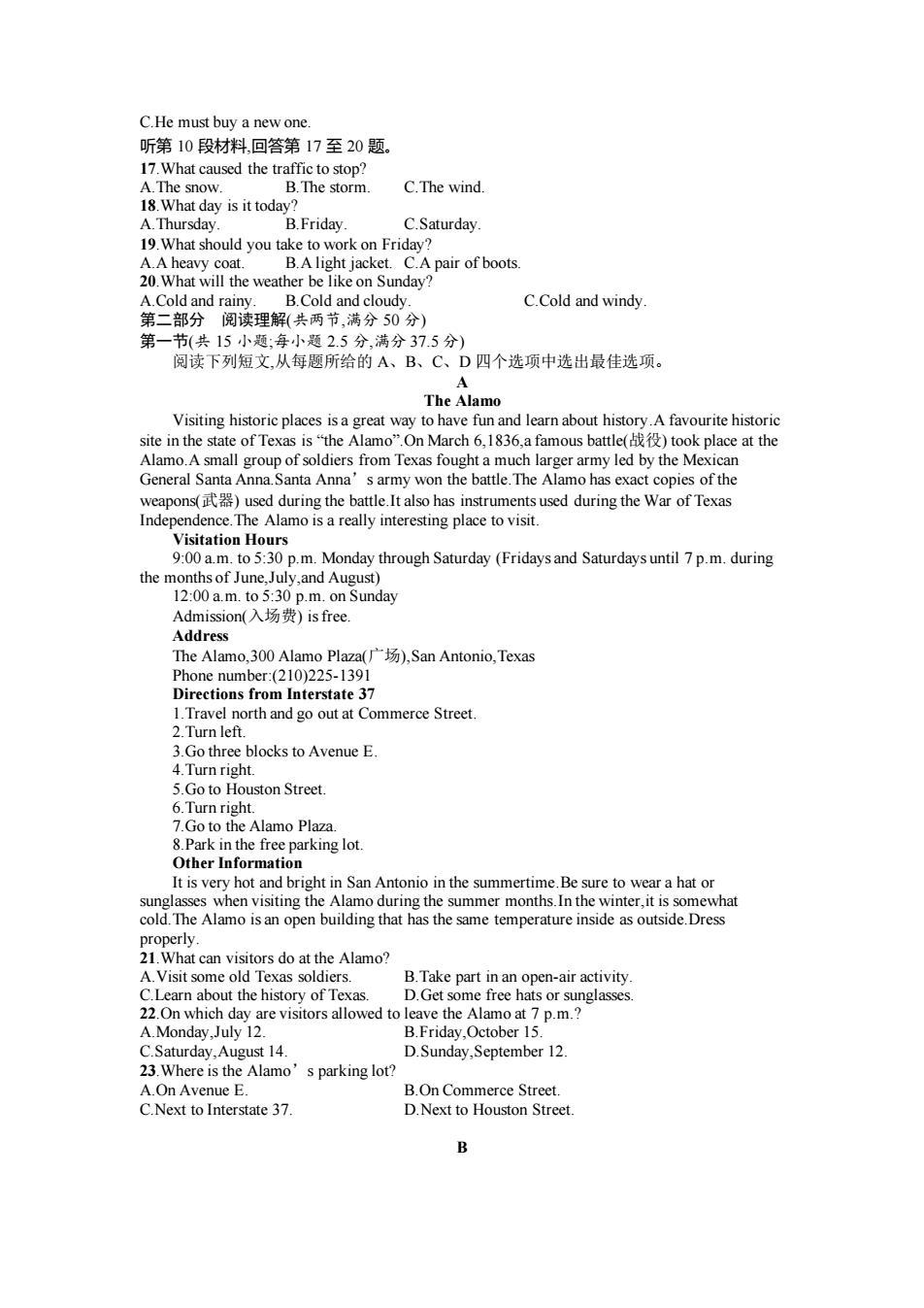
C.He must buy a new one. 听第10段材料,回答第17至20题。 17.What caused the traffic to stop? A.The snow. B.The storm. C.The wind 18.What day is it today? A.Thursday. B.Friday C.Saturday. 19.What should you take to work on Friday? A.A heavy coat. B.A light jacket.C.A pair of boots. 20.What will the weather be like on Sunday? A.Cold and rainy.B.Cold and cloudy C.Cold and windy 第二部分阅读理解(共两节,满分50分) 第一节(共15小题;每小题2.5分,满分37.5分) 阅读下列短文,从每题所给的A、B、C、D四个选项中选出最佳选项。 The Alamo Visiting historic places is a great way to have fun and learn about history.A favourite historic site in the state of Texas is‘“the Alamo”,.On March6,l836,a famous battle(战役)took place at the Alamo.A small group of soldiers from Texas fought a much larger army led by the Mexican General Santa Anna.Santa Anna's army won the battle.The Alamo has exact copies of the weapons(used during the battle.It also has instruments used during the War of Texas Independence.The Alamo is a really interesting place to visit. Visitation Hours 9:00 a.m.to 5:30 p.m.Monday through Saturday (Fridays and Saturdays until 7 p.m.during the months of June,July,and August) 12:00 a.m.to 5:30 p.m.on Sunday Admission(入场费)isfree. Address The Alamo.300 Alamo Plaza().San Antonio.Texas Phone number:(210)225-1391 Directions from Interstate 37 1.Travel north and go out at Commerce Street. 2.Turn left. 3.Go three blocks to Avenue E 4.Turn right. 5.Go to Houston Street. 6.Turn right. 7.Go to the Alamo Plaza. 8.Park in the free parking lot. Other Information It is very hot and bright in San Antonio in the summertime.Be sure to wear a hat or sunglasses when visiting the Alamo during the summer months.In the winter,it is somewhat cold.The Alamo is an open building that has the same temperature inside as outside.Dress properly 21.What can visitors do at the Alamo? A.Visit some old Texas soldiers. B.Take part in an open-air activity. C.Learn about the history of Texas. D.Get some free hats or sunglasses. 22.On which day are visitors allowed to leave the Alamo at 7 p.m.? A.Monday.July 12. B.Friday.October 15. C.Saturday,August 14. D.Sunday,September 12 23.Where is the Alamo's parking lot? A.On Avenue E. B.On Commerce Street. C.Next to Interstate 37 D.Next to Houston Street. B
C.He must buy a new one. 听第 10 段材料,回答第 17 至 20 题。 17.What caused the traffic to stop? A.The snow. B.The storm. C.The wind. 18.What day is it today? A.Thursday. B.Friday. C.Saturday. 19.What should you take to work on Friday? A.A heavy coat. B.A light jacket. C.A pair of boots. 20.What will the weather be like on Sunday? A.Cold and rainy. B.Cold and cloudy. C.Cold and windy. 第二部分 阅读理解(共两节,满分 50 分) 第一节(共 15 小题;每小题 2.5 分,满分 37.5 分) 阅读下列短文,从每题所给的 A、B、C、D 四个选项中选出最佳选项。 A The Alamo Visiting historic places is a great way to have fun and learn about history.A favourite historic site in the state of Texas is “the Alamo”.On March 6,1836,a famous battle(战役) took place at the Alamo.A small group of soldiers from Texas fought a much larger army led by the Mexican General Santa Anna.Santa Anna’s army won the battle.The Alamo has exact copies of the weapons(武器) used during the battle.It also has instruments used during the War of Texas Independence.The Alamo is a really interesting place to visit. Visitation Hours 9:00 a.m. to 5:30 p.m. Monday through Saturday (Fridays and Saturdays until 7 p.m. during the months of June,July,and August) 12:00 a.m. to 5:30 p.m. on Sunday Admission(入场费) is free. Address The Alamo,300 Alamo Plaza(广场),San Antonio,Texas Phone number:(210)225-1391 Directions from Interstate 37 1.Travel north and go out at Commerce Street. 2.Turn left. 3.Go three blocks to Avenue E. 4.Turn right. 5.Go to Houston Street. 6.Turn right. 7.Go to the Alamo Plaza. 8.Park in the free parking lot. Other Information It is very hot and bright in San Antonio in the summertime.Be sure to wear a hat or sunglasses when visiting the Alamo during the summer months.In the winter,it is somewhat cold.The Alamo is an open building that has the same temperature inside as outside.Dress properly. 21.What can visitors do at the Alamo? A.Visit some old Texas soldiers. B.Take part in an open-air activity. C.Learn about the history of Texas. D.Get some free hats or sunglasses. 22.On which day are visitors allowed to leave the Alamo at 7 p.m.? A.Monday,July 12. B.Friday,October 15. C.Saturday,August 14. D.Sunday,September 12. 23.Where is the Alamo’s parking lot? A.On Avenue E. B.On Commerce Street. C.Next to Interstate 37. D.Next to Houston Street. B
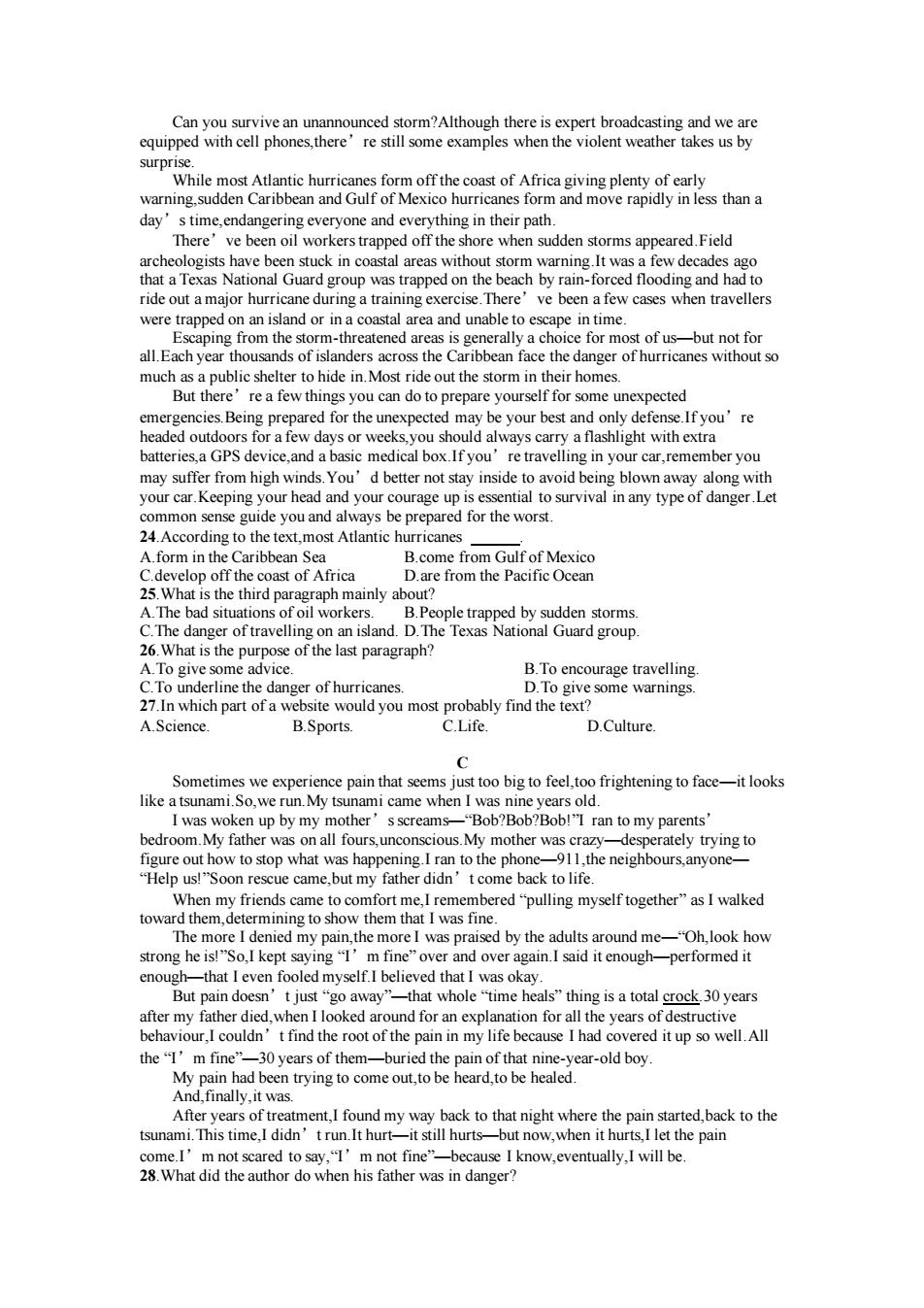
Can you survive an unannounced storm?Although there is expert broadcasting and we are equipped with cell phones,there're still some examples when the violent weather takes us by surprise. While most Atlantic hurricanes form off the coast of Africa giving plenty of early warning,sudden Caribbean and Gulf of Mexico hurricanes form and move rapidly in less than a day's time,endangering everyone and everything in their path. There've been oil workers trapped off the shore when sudden storms appeared.Field archeologists have been stuck in coastal areas without storm warning.It was a few decades ago that a Texas National Guard group was trapped on the beach by rain-forced flooding and had to ride out a major hurricane during a training exercise.There've been a few cases when travellers were trapped on an island or in a coastal area and unable to escape in time. Escaping from the storm-threatened areas is generally a choice for most of us-but not for all.Each year thousands of islanders across the Caribbean face the danger of hurricanes without so much as a public shelter to hide in.Most ride out the storm in their homes. But there're a few things you can do to prepare yourself for some unexpected emergencies.Being prepared for the unexpected may be your best and only defense.If you're headed outdoors for a few days or weeks.you should always carry a flashlight with extra batteries,a GPS device,and a basic medical box.If you're travelling in your car,remember you may suffer from high winds.You'd better not stay inside to avoid being blown away along with your car.Keeping your head and your courage up is essential to survival in any type of danger.Let common sense guide you and always be prepared for the worst. 24.According to the text,most Atlantic hurricanes A.form in the Caribbean Sea B.come from Gulf of Mexico C.develop off the coast of Africa D.are from the Pacific Ocean 25.What is the third paragraph mainly about? A.The bad situations of oil workers.B.People trapped by sudden storms. C.The danger of travelling on an island.D.The Texas National Guard group. 26.What is the purpose of the last paragraph? A.To give some advice. B.To encourage travelling C.To underline the danger of hurricanes. D.To give some warnings. 27.In which part of a website would you most probably find the text? A.Science B.Sports. C.Life D.Culture Sometimes we experience pain that seems just too big to feel,too frightening to face-it looks like a tsunami.So,we run.My tsunami came when I was nine years old. I was woken up by my mother's screams-"Bob?Bob?Bob!"I ran to my parents' bedroom.My father was on all fours.unconscious.My mother was crazy-desperately trying to figure out how to stop what was happening.I ran to the phone-911,the neighbours,anyone- "Help us!"Soon rescue came,but my father didn't come back to life. When my friends came to comfort me,I remembered "pulling myself together"as I walked toward them,determining to show them that I was fine. The more I denied my pain,the more I was praised by the adults around me-"Oh,look how strong he is!"So,I kept saying"I'm fine"over and over again.I said it enough-performed it enough-that I even fooled myself.I believed that I was okay. But pain doesn't just“go away”--that whole“time heals'”thing is a total crock30 years after my father died,when I looked around for an explanation for all the years of destructive behaviour,I couldn't find the root of the pain in my life because I had covered it up so well.All the"I'm fine"-30 years of them-buried the pain of that nine-year-old boy My pain had been trying to come out,to be heard,to be healed And finally.it was. After years of treatment,I found my way back to that night where the pain started,back to the tsunami.This time,I didn't run.It hurt-it still hurts-but now,when it hurts,I let the pain come.I'm not scared to say,"I'm not fine"-because I know,eventually,I will be. 28.What did the author do when his father was in danger?
Can you survive an unannounced storm?Although there is expert broadcasting and we are equipped with cell phones,there’re still some examples when the violent weather takes us by surprise. While most Atlantic hurricanes form off the coast of Africa giving plenty of early warning,sudden Caribbean and Gulf of Mexico hurricanes form and move rapidly in less than a day’s time,endangering everyone and everything in their path. There’ve been oil workers trapped off the shore when sudden storms appeared.Field archeologists have been stuck in coastal areas without storm warning.It was a few decades ago that a Texas National Guard group was trapped on the beach by rain-forced flooding and had to ride out a major hurricane during a training exercise.There’ve been a few cases when travellers were trapped on an island or in a coastal area and unable to escape in time. Escaping from the storm-threatened areas is generally a choice for most of us—but not for all.Each year thousands of islanders across the Caribbean face the danger of hurricanes without so much as a public shelter to hide in.Most ride out the storm in their homes. But there’re a few things you can do to prepare yourself for some unexpected emergencies.Being prepared for the unexpected may be your best and only defense.If you’re headed outdoors for a few days or weeks,you should always carry a flashlight with extra batteries,a GPS device,and a basic medical box.If you’re travelling in your car,remember you may suffer from high winds.You’d better not stay inside to avoid being blown away along with your car.Keeping your head and your courage up is essential to survival in any type of danger.Let common sense guide you and always be prepared for the worst. 24.According to the text,most Atlantic hurricanes . A.form in the Caribbean Sea B.come from Gulf of Mexico C.develop off the coast of Africa D.are from the Pacific Ocean 25.What is the third paragraph mainly about? A.The bad situations of oil workers. B.People trapped by sudden storms. C.The danger of travelling on an island. D.The Texas National Guard group. 26.What is the purpose of the last paragraph? A.To give some advice. B.To encourage travelling. C.To underline the danger of hurricanes. D.To give some warnings. 27.In which part of a website would you most probably find the text? A.Science. B.Sports. C.Life. D.Culture. C Sometimes we experience pain that seems just too big to feel,too frightening to face—it looks like a tsunami.So,we run.My tsunami came when I was nine years old. I was woken up by my mother’s screams—“Bob?Bob?Bob!”I ran to my parents’ bedroom.My father was on all fours,unconscious.My mother was crazy—desperately trying to figure out how to stop what was happening.I ran to the phone—911,the neighbours,anyone— “Help us!”Soon rescue came,but my father didn’t come back to life. When my friends came to comfort me,I remembered “pulling myself together” as I walked toward them,determining to show them that I was fine. The more I denied my pain,the more I was praised by the adults around me—“Oh,look how strong he is!”So,I kept saying “I’m fine” over and over again.I said it enough—performed it enough—that I even fooled myself.I believed that I was okay. But pain doesn’t just “go away”—that whole “time heals” thing is a total crock.30 years after my father died,when I looked around for an explanation for all the years of destructive behaviour,I couldn’t find the root of the pain in my life because I had covered it up so well.All the “I’m fine”—30 years of them—buried the pain of that nine-year-old boy. My pain had been trying to come out,to be heard,to be healed. And,finally,it was. After years of treatment,I found my way back to that night where the pain started,back to the tsunami.This time,I didn’t run.It hurt—it still hurts—but now,when it hurts,I let the pain come.I’m not scared to say,“I’m not fine”—because I know,eventually,I will be. 28.What did the author do when his father was in danger?
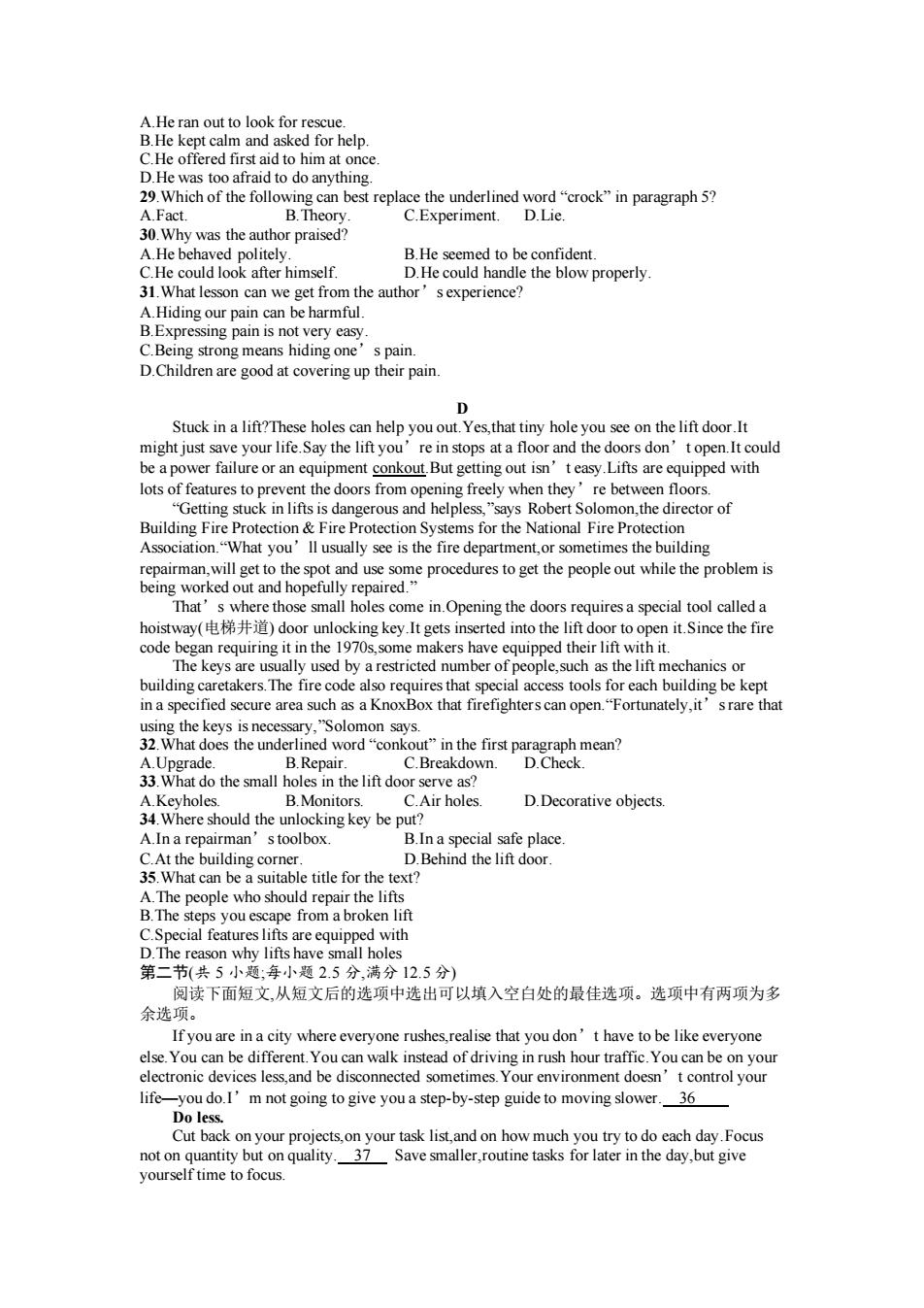
A.He ran out to look for rescue. B.He kept calm and asked for help. C.He offered first aid to him at once D.He was too afraid to do anything 29.Which of the following can best replace the underlined word"crock"in paragraph 5? A.Fact. B.Theory. C.Experiment.D.Lie. 30.Why was the author praised? A.He behaved politely. B.He seemed to be confident. C.He could look after himself. D.He could handle the blow properly. 31.What lesson can we get from the author's experience? A.Hiding our pain can be harmful. B.Expressing pain is not very easy. C.Being strong means hiding one's pain. D.Children are good at covering up their pain. D Stuck in a lift?These holes can help you out.Yes,that tiny hole you see on the lift door.It might just save your life.Say the lift you're in stops at a floor and the doors don't open.It could be a power failure or an equipment conkout.But getting out isn't easy.Lifts are equipped with lots of features to prevent the doors from opening freely when they're between floors. "Getting stuck in lifts is dangerous and helpless,"says Robert Solomon,the director of Building Fire Protection Fire Protection Systems for the National Fire Protection Association."What you'll usually see is the fire department,or sometimes the building repairman,will get to the spot and use some procedures to get the people out while the problem is being worked out and hopefully repaired." That's where those small holes come in.Opening the doors requires a special tool called a hoistway()door unlocking key.It gets inserted into the lift door to open it.Since the fire code began requiring it in the 1970s,some makers have equipped their lift with it. The keys are usually used by a restricted number of people,such as the lift mechanics or building caretakers.The fire code also requires that special access tools for each building be kept in a specified secure area such as a KnoxBox that firefighters can open."Fortunately,it's rare that using the keys is necessary,"Solomon says. 32.What does the underlined word"conkout"in the first paragraph mean? A.Upgrade. B.Repair. C.Breakdown. D.Check 33.What do the small holes in the lift door serve as? A.Keyholes. B.Monitors.C.Air holes. D.Decorative objects. 34.Where should the unlocking key be put? A.In a repairman's toolbox. B.In a special safe place. C.At the building corner. D.Behind the lift door. 35.What can be a suitable title for the text? A.The people who should repair the lifts B.The steps you escape from a broken lift C.Special features lifts are equipped with D.The reason why lifts have small holes 第二节(共5小题;每小题2.5分,满分12.5分) 阅读下面短文,从短文后的选项中选出可以填入空白处的最佳选项。选项中有两项为多 余选项。 If you are in a city where everyone rushes,realise that you don't have to be like everyone else.You can be different.You can walk instead of driving in rush hour traffic.You can be on your electronic devices less,and be disconnected sometimes.Your environment doesn't control your life-you do.I'm not going to give you a step-by-step guide to moving slower.36 Do less. Cut back on your projects,on your task list,and on how much you try to do each day.Focus not on quantity but on quality.37 Save smaller,routine tasks for later in the day,but give yourself time to focus
A.He ran out to look for rescue. B.He kept calm and asked for help. C.He offered first aid to him at once. D.He was too afraid to do anything. 29.Which of the following can best replace the underlined word “crock” in paragraph 5? A.Fact. B.Theory. C.Experiment. D.Lie. 30.Why was the author praised? A.He behaved politely. B.He seemed to be confident. C.He could look after himself. D.He could handle the blow properly. 31.What lesson can we get from the author’s experience? A.Hiding our pain can be harmful. B.Expressing pain is not very easy. C.Being strong means hiding one’s pain. D.Children are good at covering up their pain. D Stuck in a lift?These holes can help you out.Yes,that tiny hole you see on the lift door.It might just save your life.Say the lift you’re in stops at a floor and the doors don’t open.It could be a power failure or an equipment conkout.But getting out isn’t easy.Lifts are equipped with lots of features to prevent the doors from opening freely when they’re between floors. “Getting stuck in lifts is dangerous and helpless,”says Robert Solomon,the director of Building Fire Protection & Fire Protection Systems for the National Fire Protection Association.“What you’ll usually see is the fire department,or sometimes the building repairman,will get to the spot and use some procedures to get the people out while the problem is being worked out and hopefully repaired.” That’s where those small holes come in.Opening the doors requires a special tool called a hoistway(电梯井道) door unlocking key.It gets inserted into the lift door to open it.Since the fire code began requiring it in the 1970s,some makers have equipped their lift with it. The keys are usually used by a restricted number of people,such as the lift mechanics or building caretakers.The fire code also requires that special access tools for each building be kept in a specified secure area such as a KnoxBox that firefighters can open.“Fortunately,it’s rare that using the keys is necessary,”Solomon says. 32.What does the underlined word “conkout” in the first paragraph mean? A.Upgrade. B.Repair. C.Breakdown. D.Check. 33.What do the small holes in the lift door serve as? A.Keyholes. B.Monitors. C.Air holes. D.Decorative objects. 34.Where should the unlocking key be put? A.In a repairman’s toolbox. B.In a special safe place. C.At the building corner. D.Behind the lift door. 35.What can be a suitable title for the text? A.The people who should repair the lifts B.The steps you escape from a broken lift C.Special features lifts are equipped with D.The reason why lifts have small holes 第二节(共 5 小题;每小题 2.5 分,满分 12.5 分) 阅读下面短文,从短文后的选项中选出可以填入空白处的最佳选项。选项中有两项为多 余选项。 If you are in a city where everyone rushes,realise that you don’t have to be like everyone else.You can be different.You can walk instead of driving in rush hour traffic.You can be on your electronic devices less,and be disconnected sometimes.Your environment doesn’t control your life—you do.I’m not going to give you a step-by-step guide to moving slower. 36 Do less. Cut back on your projects,on your task list,and on how much you try to do each day.Focus not on quantity but on quality. 37 Save smaller,routine tasks for later in the day,but give yourself time to focus
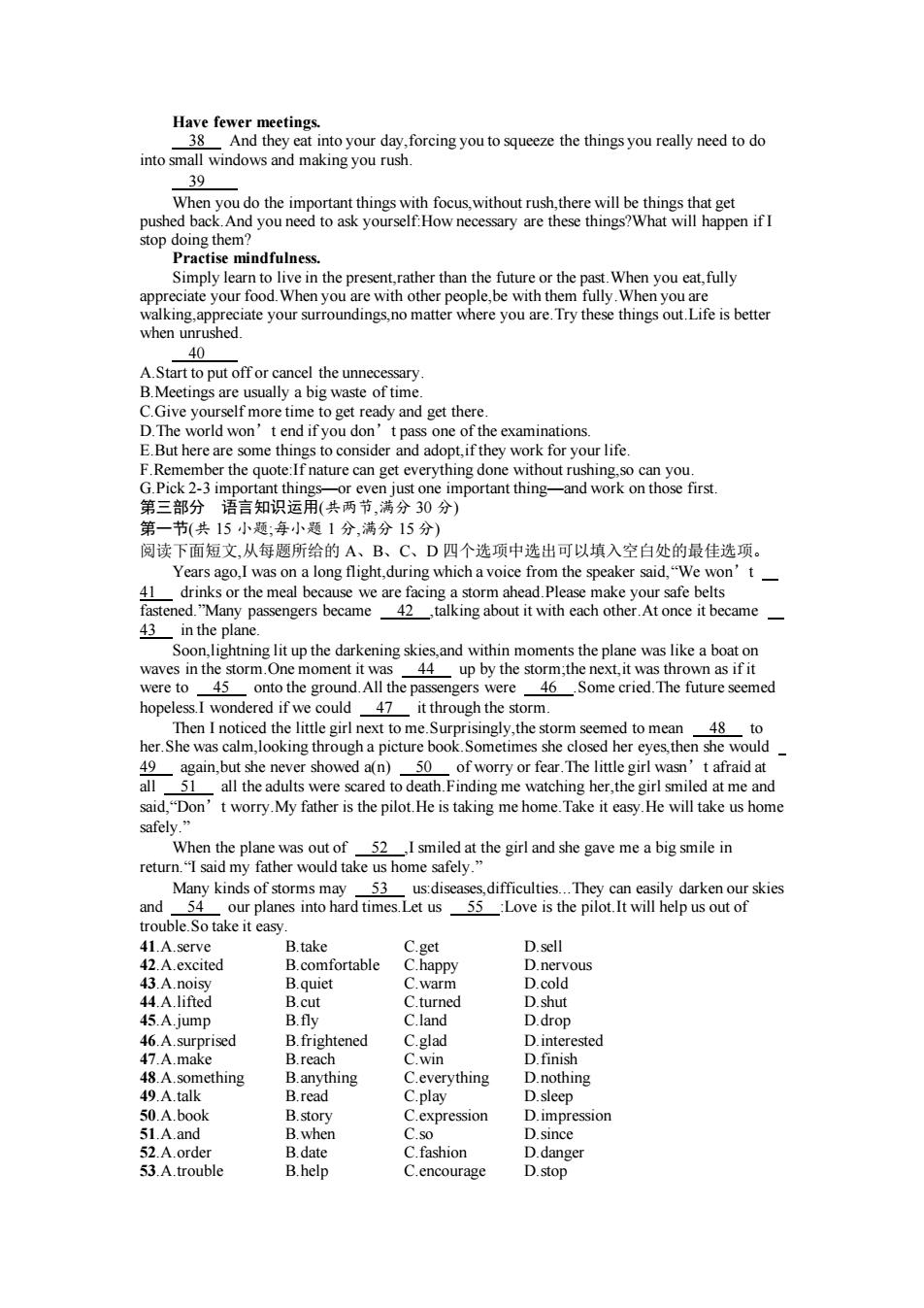
Have fewer meetings. 38 And they eat into your day,forcing you to squeeze the things you really need to do into small windows and making you rush. 39 When you do the important things with focus,without rush,there will be things that get pushed back.And you need to ask yourself:How necessary are these things?What will happen ifI stop doing them? Practise mindfulness. Simply learn to live in the present.rather than the future or the past.When you eat fully appreciate your food.When you are with other people,be with them fully.When you are walking,appreciate your surroundings,no matter where you are.Try these things out.Life is better when unrushed. 40 A.Start to put off or cancel the unnecessary B.Meetings are usually a big waste of time. C.Give yourself more time to get ready and get there. D.The world won't end if you don't pass one of the examinations. E.But here are some things to consider and adopt,if they work for your life F.Remember the quote:If nature can get everything done without rushing,so can you. G.Pick 2-3 important things-or even just one important thing-and work on those first. 第三部分语言知识运用(共两节,满分30分) 第一节(共15小题;每小题1分,满分15分) 阅读下面短文,从每题所给的A、B、C、D四个选项中选出可以填入空白处的最佳选项。 Years ago,I was on a long flight,during which a voice from the speaker said,"We won't 41 drinks or the meal because we are facing a storm ahead.Please make your safe belts fastened."Many passengers became 42,talking about it with each other.At once it became 43 in the plane. Soon,lightning lit up the darkening skies,and within moments the plane was like a boat on waves in the storm.One moment it was 44 up by the storm;the next,it was thrown as if it were to 45 onto the ground.All the passengers were 46 Some cried.The future seemed hopeless.I wondered if we could 47 it through the storm. Then I noticed the little girl next to me.Surprisingly,the storm seemed to mean 48 to her.She was calm,looking through a picture book.Sometimes she closed her eyes,then she would 49 again,but she never showed a(n)50 of worry or fear.The little girl wasn't afraid at all 51 all the adults were scared to death.Finding me watching her,the girl smiled at me and said,"Don't worry.My father is the pilot.He is taking me home.Take it easy.He will take us home safely.” When the plane was out of 52,I smiled at the girl and she gave me a big smile in return."I said my father would take us home safely." Many kinds of storms may 53 us:diseases,difficulties...They can easily darken our skies and 54 our planes into hard times.Let us 55 Love is the pilot.It will help us out of trouble.So take it easy. 41.A.serve B.take C.get D.sell 42.A.excited B.comfortable C.happy D.nervous 43.A.noisy B.quiet C.warm D.cold 44.A.lifted B.cut C.turned D.shut 45.A.jump B.fly C.land D.drop 46.A.surprised B.frightened C.glad D.interested 47.A.make B.reach C.win D.finish 48.A.something B.anything C.everything D.nothing 49.A.talk B.read C.play D.sleep 50.A.book B.story C.expression D.impression 51.A.and B.when C.so D.since 52.A.order B.date C.fashion D.danger 53.A.trouble B.help C.encourage D.stop
Have fewer meetings. 38 And they eat into your day,forcing you to squeeze the things you really need to do into small windows and making you rush. 39 When you do the important things with focus,without rush,there will be things that get pushed back.And you need to ask yourself:How necessary are these things?What will happen if I stop doing them? Practise mindfulness. Simply learn to live in the present,rather than the future or the past.When you eat,fully appreciate your food.When you are with other people,be with them fully.When you are walking,appreciate your surroundings,no matter where you are.Try these things out.Life is better when unrushed. 40 A.Start to put off or cancel the unnecessary. B.Meetings are usually a big waste of time. C.Give yourself more time to get ready and get there. D.The world won’t end if you don’t pass one of the examinations. E.But here are some things to consider and adopt,if they work for your life. F.Remember the quote:If nature can get everything done without rushing,so can you. G.Pick 2-3 important things—or even just one important thing—and work on those first. 第三部分 语言知识运用(共两节,满分 30 分) 第一节(共 15 小题;每小题 1 分,满分 15 分) 阅读下面短文,从每题所给的 A、B、C、D 四个选项中选出可以填入空白处的最佳选项。 Years ago,I was on a long flight,during which a voice from the speaker said,“We won’t 41 drinks or the meal because we are facing a storm ahead.Please make your safe belts fastened.”Many passengers became 42 ,talking about it with each other.At once it became 43 in the plane. Soon,lightning lit up the darkening skies,and within moments the plane was like a boat on waves in the storm.One moment it was 44 up by the storm;the next,it was thrown as if it were to 45 onto the ground.All the passengers were 46 .Some cried.The future seemed hopeless.I wondered if we could 47 it through the storm. Then I noticed the little girl next to me.Surprisingly,the storm seemed to mean 48 to her.She was calm,looking through a picture book.Sometimes she closed her eyes,then she would 49 again,but she never showed a(n) 50 of worry or fear.The little girl wasn’t afraid at all 51 all the adults were scared to death.Finding me watching her,the girl smiled at me and said,“Don’t worry.My father is the pilot.He is taking me home.Take it easy.He will take us home safely.” When the plane was out of 52 ,I smiled at the girl and she gave me a big smile in return.“I said my father would take us home safely.” Many kinds of storms may 53 us:diseases,difficulties...They can easily darken our skies and 54 our planes into hard times.Let us 55 :Love is the pilot.It will help us out of trouble.So take it easy. 41.A.serve B.take C.get D.sell 42.A.excited B.comfortable C.happy D.nervous 43.A.noisy B.quiet C.warm D.cold 44.A.lifted B.cut C.turned D.shut 45.A.jump B.fly C.land D.drop 46.A.surprised B.frightened C.glad D.interested 47.A.make B.reach C.win D.finish 48.A.something B.anything C.everything D.nothing 49.A.talk B.read C.play D.sleep 50.A.book B.story C.expression D.impression 51.A.and B.when C.so D.since 52.A.order B.date C.fashion D.danger 53.A.trouble B.help C.encourage D.stop